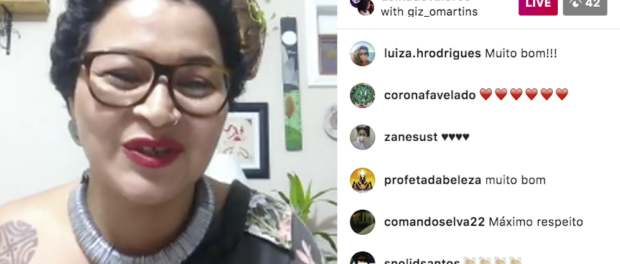
This is our latest article on the new coronavirus as it impacts Rio de Janeiro’s favelas.
On June 4, Usina de Valores, a project launched by the Vladimir Herzog Institute to facilitate dialogue on human rights issues, held a live event on Instagram called “Favela Hustle.” Viewers tuned in as Deise Pimenta, an educator for Usina de Valores, interviewed Gizele Martins and Raphael Cruz on their experiences as community activists in the favelas of Complexo da Maré during the Covid-19 pandemic. The conversation focused on Cruz and Martins’ innovative favela-based solutions, with an emphasis on local communication and public awareness campaigns.
Gizele Martins on Community Organizing and Communication
Martins, a Maré activist, journalist with 15 years’ experience, and chief editor of the local O Cidadão newspaper, emphasized the importance of favela resident voices, especially in counteracting the Brazilian government’s false narratives and stereotypes. To do so, “we have to write our history,” she said. Martins is a leading member of the Maré Mobilization Front Against Covid-19, which has been distributing essential food and supplies to Maré residents, as well as to spread accurate information regarding Covid-19.
Challenges to Essential Food and Supplies Distribution
In response to Pimenta’s questions about the difficulties that the Maré Mobilization Front faces, Martins stressed that the sheer size of Maré—16 favelas housing 140,000 residents—makes the distribution of food and supplies an enormous task. While Martins lamented that “it isn’t possible to serve everyone,” the Maré Mobilization Front has already reached 3,000 families with basic goods. Martins highlighted that, in order to tackle Covid-19, her community “needs solidarity—if not, we will not survive;” after all, she said, “it’s not the government that’s going to save our lives.”
Speaking from her expertise as a writer on public security, Martins discussed the status of police operations in the favelas during the pandemic. Maré, now a Covid-19 epicenter, has long suffered from deadly police operations. Throughout the state, such operations have increased in frequency and lethality during quarantine, often hindering community relief efforts. Martins reflected on the killing of 19-year-old Rodrigo Cerqueira, shot by police during a food parcel distribution in the Providência favela in downtown Rio, noting that there have been several other cases of police operations interrupting food distribution. Martins explained that such cases reveal that “the government doesn’t want us to survive.” Instead, “we are a laboratory for the politics of death.”
Spreading Accurate Information While Combatting Fake News
Martins underscored the importance of finding creative solutions to share information about Covid-19 with residents of Maré. “Community communication is not easy […] we need to continually adapt.” The Maré Mobilization Front has implemented an array of strategies: team members drive a rented car equipped with a sound system through the streets, broadcasting Covid-19 safety recommendations, descriptions of the virus’ symptoms, and recently, messages about resources for victims of domestic violence; collaborators help distribute informational pamphlets to individual homes, and they have also produced street art and mounted banners at strategic points throughout Complexo da Maré.
Pimenta asked Martins to comment on the impact of fake news in the favela and the danger of such disinformation during the pandemic. Many news outlets, in their portrayal of favela residents, reinforce harmful stereotypes. In constructing a unified response to such gross misrepresentations of favelas, Martins explained that “it is essential we always touch on racial matters, ideological matters, […creating] another narrative so that we can have a different society and world.”
Raphael Cruz on Using Visual Media During the Pandemic
Raphael Cruz, a communication activist, visual artist, and creator of the Instagram page, “Corona Favelado,” uses videos to disseminate recommendations for Covid-19 prevention. Cruz lamented that there are many barriers to communication in the favelas, but said he is determined to facilitate the exchange of correct, direct information.
At the beginning of the pandemic, Cruz joined the Maré Mobilization Front to create the community’s Covid-19 graffiti mural, where the progression of cases and total deaths are tallied and updated regularly. Encouraged by his important contribution to Maré’s Covid-19 communication strategy, Cruz began to create Instagram videos, which “produced a very strong, very real dialogue.” Thus, Corona Favelado was born. The videos feature Cruz’s face atop a pixelated woman dancing samba on Copacabana’s famous sidewalk, urging viewers to wear masks, wash their hands, and beware of fake news.
Financial Challenges for the Arts
Cruz provided insight into the difficulty the art community faces, now more than ever, in generating income. Cruz reflected on the financial burden that Covid-19 has placed on funk music artists and funk party organizers: “the funk ball is a huge economic generator for the favela […] the favela party is not just a party.” Although safety precautions are difficult to enforce at a funk ball, Cruz acknowledged that “[those] in charge of the parties will have to reopen due to matters of income, since they are out of money.”
Cruz, like so many other visual artists, has had to reinvent himself during the pandemic. The arts community as a whole has “begun to exchange experiences to begin anew, to learn how to survive again,” said Cruz, noting that this mutual support has strengthened the bonds in the arts community. “It is time for us to communicate, to network.” Although proving difficult during the pandemic, Cruz has continued to sell his art. Cruz says it’s important that he “paints mostly for his neighborhood;” to do so, he accommodates his customers’ financial needs, allowing them to pay in installments. As young favela activists and artists, Cruz and others are finding ways “to be able to survive, […] survive doing what we love, which is difficult.”



